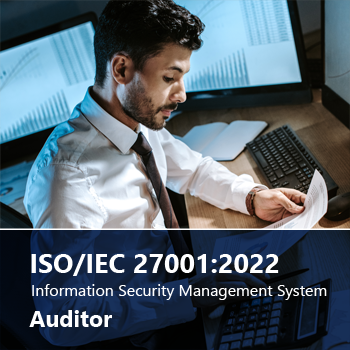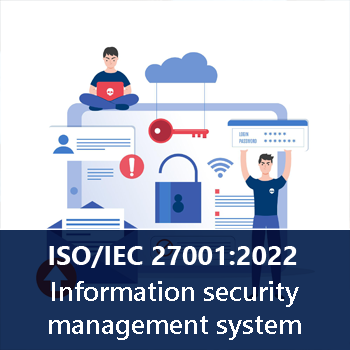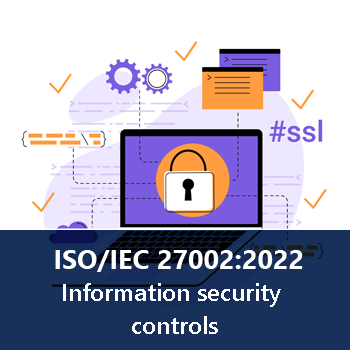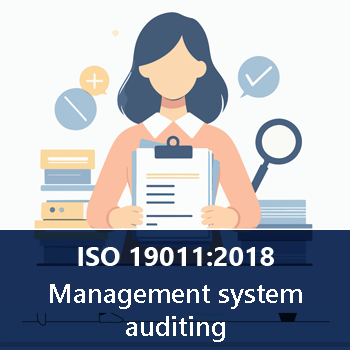How to become an information security management system (ISMS) auditor: requirements, benefits, and pathway
Published on September 30, 2024

In today’s digital landscape, protecting sensitive information is a top priority for organizations across all industries. This is where the role of an Information Security Management System (ISMS) auditor becomes important.
As an ISMS auditor, your primary responsibility is to ensure that organizations comply with the requirements of ISO/IEC 27001:2022 and have robust processes to protect the confidentiality, integrity and availability of information.
In this article, we’ll explore the steps to becoming an ISMS auditor, the qualifications and skills required, the benefits of this career path, and how you can start your journey.
What does an ISMS auditor do?
An ISMS auditor assesses an organization's information security processes, to verify whether they comply with the requirements of ISO/IEC 27001.
This assessement takes the form of an audit. Audits help identify gaps, weaknesses and areas for improvement where the organization should focus its efforts to ensure compliance and improve its performance.
Why become an ISMS auditor?
Here are a few reasons:
- High demand: With increasing cybersecurity threats and compliance regulations, ISMS auditors are in high demand.
- Variety of industries: As an auditor, you can work across various industries including IT, healthcare, finance and manufacturing.
- Attractive salary: Experienced ISMS auditors often enjoy competitive salaries.
- Career growth: It provides pathways to more advanced roles in information security and compliance management.
- Global relevance: ISO/IEC 27001 is a global standard, meaning your skills are transferable across borders.
Requirements for becoming an ISMS auditor
To become an ISMS auditor, you must meet a combination of educational, professional, and certification requirements. Here’s a breakdown:
1. Educational background
To become an ISMS auditor you should have a background in:
- Information technology (IT)
- Cybersecurity
- Computer science
- Information systems management or
- Business management
A bachelor’s degree in these fields is typically expected, although some may start with an associate degree paired with strong professional experience.
2. Professional experience
Work experience in information security, IT compliance, or risk management is essential.
Ideally, you should have 2-5 years of experience working in positions that deal with IT infrastructure, cybersecurity controls, or regulatory compliance.
3. Training and certifications
You should have training to prove knowleged of the requirements of ISO/IEC 27001, including the information security controls in the annex of the standard. Here are a few examples of relevant trainings that you should consider if you want to become an ISMS auditor.
- ISO/IEC 27001:2022 ISMS Auditor: This is a training and certification that proves your knowledge and understanding of how the requirements for an ISMS can be assessed.
- ISO/IEC 27001:2022 ISMS Practitioner: This certificaiton proves that you have good knowledge of how an ISMS can be established and implemented
- Specific training in areas such as cryptography, physical security, networks security, incident management, information security risk management, business continuity or privacy will help you a lot in your ISMS auditor career.
The path to becoming an ISMS Auditor
1. Start with the basics
- Gain foundational knowledge in IT, cybersecurity, HR security or phyiscal security. This can be achieved through academic programs, entry-level IT jobs, or online courses on topics like networking, system administration, and information security fundamentals.
2. Acquire professional experience
- Work in roles such as IT compliance, risk management or cybersecurity. Get exposure to information security management systems and become familiar with the standards (ISO/IEC 27001, ISO/IEC 27002, ISO/IEC 27035, ISO/IEC 27005, ISO/IEC 27033, etc.)
3. Get certified
- Choose a certification that you find suitable and take the exam to prove your knowlege and get the recognition.
4. Develop soft skills
- Communication: Auditors need strong verbal and written communication skills to present findings to clients or management effectively.
- Attention to detail: A successful auditor is meticulous in identifying potential security risks and areas of non-compliance.
- Analytical thinking: You must be able to analyze complex security systems, assess risks, and make informed recommendations.
5. Apply for ISMS auditing positions
- Once you have the experience and certifications, you can apply for ISMS auditor roles within organizations or as an external consultant.
6. Gain lead auditor experience
- After gaining initial experience as an ISMS auditor, you can aim to become a Lead Auditor where you’ll oversee audit teams and carry out more complex audits.
Benefits of becoming an ISMS Auditor
- Job security: As data protection becomes more critical, organizations across the globe are looking for experts who can ensure compliance with security regulations.
- Career growth: Opportunities to move into senior roles like Lead Auditor, Compliance Manager, or Chief Information Security Officer (CISO).
- International opportunities: Since ISO 27001 is a global standard, ISMS auditors have the flexibility to work in various countries or provide consulting services internationally.
- Satisfaction in ensuring security: You’ll play a key role in protecting sensitive information and contributing to the overall security of organizations.
Conclusion
Becoming an ISMS auditor is a rewarding career path that offers both financial and professional growth opportunities. By following the right steps—gaining relevant experience, obtaining the necessary certifications, and honing your auditing skills—you can carve a successful career in the growing field of information security auditing.
If you’re passionate about cybersecurity, risk management, and compliance, this path offers long-term stability and the chance to make a significant impact in today’s digital world.




